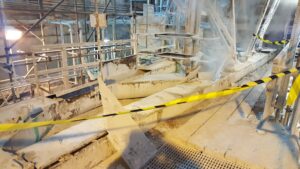Openreach fined following death of engineer
Openreach Limited has been fined £1.34 million after an engineer died whilst trying to repair a telephone line.
Alun Owen, from Bethesda, died after he slipped and fell into the River Aber in Abergwyngregyn and was swept away on 6 October 2020.
The 32-year-old has been described by his family as a ‘loving and selfless character’.
An investigation by the Health and Safety Executive (HSE) and North Wales Police, found that a number of Openreach engineers had been attempting to repair the telephone lines, which ran across the river, over a period of two months. They had been working both near and in the river. At the time of the incident, there had been flooding in the area which meant the river was much higher and faster flowing than usual.
Mr Owen entered the water and made his way to an island in the middle of the river in order to try and throw a new telephone cable across to the other side by taping it to a hammer and then throwing the hammer. Whilst attempting to cross the remaining section of the river, he slipped in a deeper part and the force of the river swept him away.

The investigation found that there was no safe system of work in place for work on or near water, nor had Mr Owen – and others working by the river – received training, information or instruction on safe working on or near water.
A statement from Mr Owen’s family said: “The genuine love and affection shown to us since the tragedy that unfolded on the 6 October 2020 is a real testimony to Al and how everyone just loved his friendly, loving and selfless character.
“Although it’s sometimes difficult to see beyond the sorrow, we will keep his memory alive through reminiscing those many precious moments he had in his love-filled life.”
Openreach Limited pleaded guilty to breaching Section 2 (1) of the Health and Safety at work etc. Act 1974. The company was fined £1.34 million and ordered to pay costs of £15,858.35 at Llandudno Magistrates’ Court on 5 June 2024.
Speaking after the case, HSE inspector Christina Roberts said: “This was a tragic incident that resulted in the death of a much loved young man.
“Mr Owen’s family, friends and colleagues have always remained in our thoughts.
“His death would have been preventable had an effective system for working on or near water been in place.
“Mr Owen should not have been put in the unsafe working situation. Companies should learn the lessons from this incident if they have staff who may work on or near water and be aware that HSE will not hesitate to take appropriate enforcement action against those that fall below the required standards.”
North Wales Police Detective Chief Inspector Andy Gibson said: “Our thoughts remain with Alun’s family at this difficult time.
“North Wales Police worked closely with HSE and whilst it was a protracted and lengthy investigation, it was critical that any failings were identified and acted upon.”
This prosecution was brought by HSE senior enforcement lawyer Nathan Cook and supported by HSE paralegal officer Sarah Thomas.
Notes to Editors:
- The Health and Safety Executive(HSE) is Britain’s national regulator for workplace health and safety. We prevent work-related death, injury and ill health through regulatory actions that range from influencing behaviours across whole industry sectors through to targeted interventions on individual businesses. These activities are supported by globally recognised scientific expertise.
- More information about the legislationreferred to in this case is available.
- Further details on the latest HSE news releasesis available.


